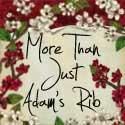I refer to it as the “hopeless bed.” It’s the one I still don’t know what to do
with, haven’t figured out how to save from the hay field that always comes
knocking, wanting its territory back.
This is the flower bed that last summer was home to a
five-story hornet’s nest with a diameter the size of a tennis racket. This summer, it has housed three large red
wasp nests hanging inconspicuously from woody white verbena stems. Blessedly, I have only felt the stinging
wrath of one who returned home to find me at his broken home.
As if impediments of the pointy tailed variety weren’t
enough, early this spring, my father in law was a little too exuberant in his
spraying of the winter weeds across the hay field, which stops at an invisible
mowed line a few feet from this very bed.
The weed poison decimated my voluptuous verbena plants that ran our
house’s full-length, providing evergreen and snowy white undergrowth for the sky-loving
pink roses.
Husband listens with an attentive ear to my frustrations,
suggests digging everything up, soaking it down with Roundup, and starting
over. While starting over sounds good,
it would mean digging up all the hurricane lilies hiding beneath the surface,
the ones I tucked away there almost two years ago.
No one may know they’re there but me. I’ve been waiting, watching after this particular
variety of lily that never blooms the first year it’s moved to a new
location. Only in the second year do the
bulbs begin producing lilies that look like crimson, long-legged spiders
walking on air.
To literally start over would mean two more years of waiting
for their blooms.
And so, I soak shirts full of sweat, pull an index finger
callous worth of weeds, and dig out six inch hay roots until my fingernails are
definitely unladylike, all while keeping my eyes out for airborne stingers.
Each time I fight with the land, I am reminded that I am
fighting against creation’s curse to be untamable wilderness. Until Christ’s
return, it’s literally an un-win-able fight.
But each time I fight, I realize what I verbally label
“hopeless” to all who will listen, in my heart, I still refuse to accept as
such.
I have a problem believing in hopelessness because I have
seen hopelessness turned into hope.
I have a problem believing something is hopeless because I
know the hope that is coming, because I know Him who IS my Hope.
I love how the English Standard Version puts it: “remember that you were at that time
separated from Christ, alienated from the commonwealth of Israel and strangers to the covenants of promise,
having no hope and without God in the world. But now in Christ Jesus you who
once were far off have been brought near by the blood of Christ”(Eph. 2:12-13).
I was hopeless. And
then there was hope.
Matthew Henry says, “Who
can, without trembling, reflect upon the misery of a person, separated for ever
from the people of God, cut off from the body of Christ, fallen from the
covenant of promise, having no hope, no Saviour, and without any God but a God
of vengeance, to all eternity? To have no part in Christ! What true Christian
can hear this without horror? Salvation is far from the wicked; but God is a
help at hand to his people; and this is by the sufferings and death of Christ.”
To give hope to the hopeless…..
We who were once far off are called to keep sowing, weeding,
pruning, harvesting, even when all seems lost.
Images: The hopeless flower bed--one from now in its wild state and two from last year during happier days.












Oh yeah. This:
ReplyDelete"I have a problem believing in hopelessness because I have seen hopelessness turned into hope."
Hi Jennifer,
ReplyDeleteGreat truth here, and it's really ringing true with me as I study and write about the life of Rahab. If ever a soul seemed hopeless, it was her.
So thankful to serve a God Who redeems and restores!
Hugs from VA,
Susan